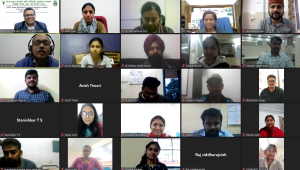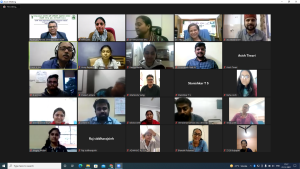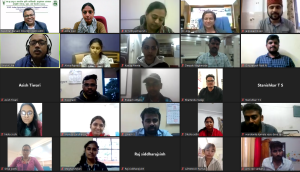This training program was organized by the Division of Agricultural Economics, IARI from December 1 –December 10, 2021, with the support of NAHEP-CAAST module of IARI. The course was targeted to introduce the students of Agricultural Economics, Extension and Statistics to advances in forecasting techniques and soft-wares during the ten days of intensive online training through Zoom platform. The sessions were planned with equal emphasis on both theory and hands-on.
Participants
We invited applications through Google forms and received immense response from nearly 200 students belonging to different states across the nation. Our criteria of selection were based on basic knowledge of R software, gender, caste and geographic distribution. Most of the students fulfilled the criteria and the selection was challenging.
Selected students represented 20 different states across the country from different esteemed institutions. All the students submitted their endorsements, which was a necessary criterion for the selection. Amongst the 54 selected students, 34 students were male which is impressive and rest 20 were female students. Based on the social category, we selected 20 OBC, 4 ST, 6 SC, 2 EWS and 22 general students for our program. Apart from that, based on the academic degree, 11 MSc. and 53 PhD students were part of the training.
From the Organizers
The training program has received an overwhelming response from the trainees, and the combined efforts of the course coordinators were the key feature that helped to select the best bunch of participants, chart out the sessions and topics, and tap the best instructors for each topic.
Two sessions were conducted in the afternoon from 3.30- 5.00 pm and 5.15 pm -6.45 pm considering the convenience of the trainees and maintaining their interest towards the program. Eminent instructors from IARI, IASRI, Giri Institute of Development Studies, NISM, CMFRI, NAARM in addition to the faculties from private sectors, explained important research tools and demonstrated those for the participants. Almost all the sessions were live streamed on social media for the benefit of larger audience.
About the training sessions
The training program was inaugurated by Dr. Rajender Parsad, Director, ICAR-IASRI, New Delhi who delivered key note address on the topic, Statistics, Web resources and Research data management on 01-12-2021. Dr. C. Viswanathan, PI CAAST briefed the audience about the activities of NAHEP-CAAST. Next session was handled by Dr. Alka Singh, Head and Professor, Division of Agricultural Economics, ICAR-IARI on data sources for social science research. The session attracted the interest of the participants as they got a comprehensive overview of the various sources of data.
Day 2 began with the introduction of R software which was the foundation session as the subsequent sessions were based on this software. There were two sessions, introduction followed by hands-on session, and both sessions were handled by Dr. A. Dhandapani, Principal Scientist, ICAR-NAARM, Hyderabad.
In Day 3, in the first session, Dr. Parmod Kumar, Director, Giri Institute of Development Studies, Lucknow introduced conceptual and theoretical frameworks of demand models for agricultural commodities which arouse interest among participants as some of their research works are based on this topic. This is followed by another interesting session by Dr. Nithyashree M L, scientist, ICAR-IARI who dealt with extraction of data from large data sets which has high relevance as primary data collection becomes a difficult during current pandemic situations.
The first session of the Day 4 dealt by Dr P Shinoj, Senior Scientist, ICAR-CMFRI, Cochin on application of commodity outlook models for agricultural commodities and policy simulations which was continuation of the discussion by Dr. Parmod Kumar. Some of the students were keen to this session as their research topics were based on this. This is followed by another interesting session by Dr. Vinay Kumar Sehgal, Principal Scientist (PS), ICAR-IARI on application of Remote Sensing and Geographic Information System data in Agricultural Research where he informed the students about the scope of using such kind of data in various areas of agriculture which was new for most of the students.
Day 5 had only one session which was dealt by Dr G K Jha, PS, ICAR-IARI who gave a brief overview of forecasting techniques using time series data. In the Day 6, Dr G K Jha continued his session on forecasting techniques with a special emphasis on univariate techniques such as ARIMA and G(ARCH) models. Second session was on future trading in agriculture and its impact on production and prices by Dr. Shanmugam V, Consultant, NISM, Maharashtra. In the Day 7, Dr. Achal Lama, Scientist, ICAR-IASRI delivered lecture on advanced forecasting techniques such as multi-equation time series model which is followed by session on cointegration analysis by Dr. G.K. Jha. Two sessions in Day 8 was exclusively on deep learning and machine learning which are gaining importance nowadays, which were handled by Dr. Pabitra Mitra, Professor, IIT-Kharagpur. The first session on Day 9 was continuation or related to what was taught in the previous day, and it was on Artificial Intelligence (AI) techniques for classification in agriculture which was dealt by Dr. Manjunath C, Deputy manager, Robert Bosch Engineering & Business Solutions Limited. Dr. Sivaramane, Principal Scientist, ICAR- NAARM, Hyderabad delivered a lecture on entrepreneurship and start-ups in agriculture in the next session.
In the final day (Day 10) the training was aptly wrapped up by the wonderful lecture by Dr. Lalit Achoth who is the visiting faculty at UAS, GKVK, Bangalore and all the students were motivated by the session. Next was the valedictory session, where Dr. R.C. Agrawal, Deputy Director General (Education), ICAR, was the chief guest of the function who addressed the participants. As per the feedback form, the trainees have responded well and have provided valuable suggestions which can be considered for future training programs.



